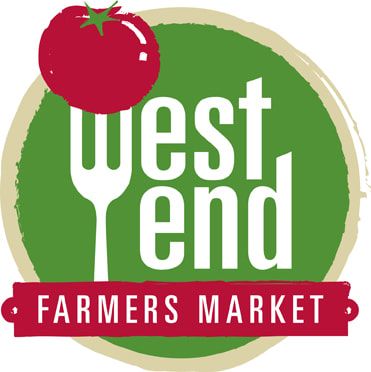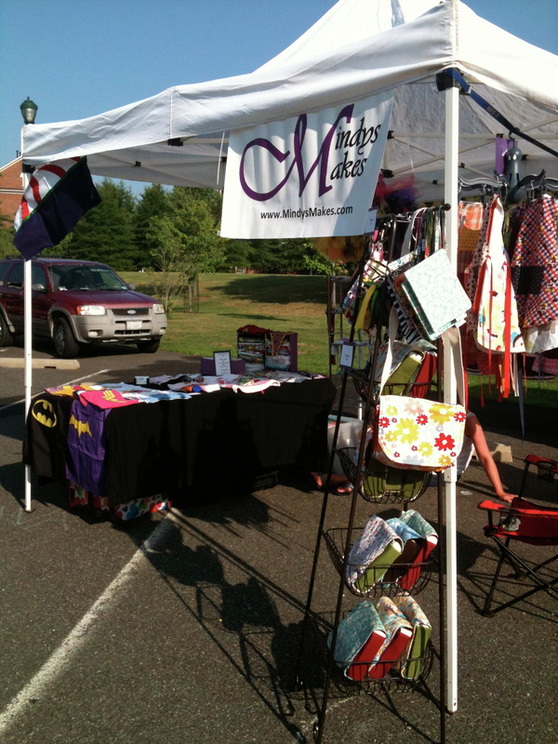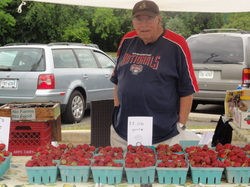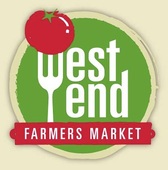|
Mindy Thompson is the creative mind - and hands - of Mindy Makes. Her delightful line of hand-sewn items includes reversible capes for little girls and little boys, summer dresses for little girls (most are reversible and some even come with matching bloomers), baby bibs, burp cloths, nursing covers and purses. Mindy partners with her mother in the making of the clothes - and who doesn't love a business owned and operated by family?
Mindy wrote up a biography to share with her customers: Mindys Makes began a year ago after many suggestions from friends who liked the items I was creating for my son, my daughter and myself. After my son was born four years ago, I used my mom's sewing machine with my very basic knowledge of sewing (I could sew a mostly straight line) to make a baby blanket for my son. It was fun so I made blankets for my friends' new children. Then I made burp cloths, took some lessons and received a new machine for Christmas. From there I explores and expanded. Mindys Makes began with just me, Mindy. But my mom, Debbie, could not stay away. She loves to make this for her grandchildren and has been sewing for most of her life, so she gladly joined me and now we work together to make unique, fun and colorful itms for young children. In addition to children's items, I love taking a couple of pieces of fabric, playing around with them to shape them into purses. Aside from creating and designing items to sell, I spend most of my time playing with my two children. I have a son who will be five in February and my daughter is two and a half. Before children, I spent my days educating high school students about he mysteries of the world, using physics. Everything I make is something that I want to put on my daughter or son, or use myself. One of the hardest things about his business is not keeping the dresses, aprons and flannel pants for my own children. Often times, they come to visit me at the market and see something that they claim is "mine!". Mindys Makes started as an online business with little direction of where to sell, but as the year progresses and summer came along, I discovered the farmers market. It is a venue that I really enjoy and where I have found a little niche. I sell at other crafter's shows, bazaars and street festivals in the area as well, but I also enjoy the familiar clientele of the farmers market in Cameron Station Susan Birchler, the Director of the West End Farmers Market, after much discussion and feedback from our vendors has decided to cancel this Sunday's market. This informed decision is based on vendor feedback yesterday and information from the National Hurricane Center and the Weather Channel which states that the worst rain, flooding and tropical storm winds will occur in our area between 3PM Saturday and Sunday morning. Some of our vendors from the VA Eastern Shore are coming from an area that is labeled high risk on the weather map and may not be able to travel due to flooding, downed trees and electricity, and dangerous road conditions. On Sunday morning the Hurricane is projected to be right off our coastline, with storm surges, flooding, tropical force winds between 30 and 60MPH. And the Potomac is expected to flood. Additionally the City of Alexandria is asking people to stay home and be ready for the lights to go out.
We recognise that this is hard coming right after a Sunday off for the Cambodian Festival. We will reopen on Labor Day weekend. Until then, please have a safe weekend.  Meet Rachel! She is working on the SNAP/EBT program project for the West End Farmers Market. She'll be meeting with market managers at other farmers markets who are currently using SNAP/EBT to find out the strengths and weaknesses of the program and what the major pitfalls were to implementing it. In addition, she'll be researching the process to apply, procure the forms; and creating a report that outlines what we need to do to implement the program. By the end of the season, she will have devised a step-by-step plan for implementing the program at the West End Farmers Market.  Meet Jasmine! She has be assisting Eden Good in educating the public about canning fresh, local foods. In May, Eden Good was selected to participate in the 2011 Discover You Can℠ program (sponsored by Jarden Home Brands, the makers of Ball® Brand Fresh Preserving Products in partnership with the Farmers Market Coaltition). The goal of the program is to help educate the community on the benefits of buying and preserving local, seasonal food and teach them sustainable, healthy living and get market patrons involved in home canning. In January 2008, the American Journal of Public Health published this article:
Effect of a Targeted Subsidy on Intake of Fruits and Vegetables Among Low-Income Women in the Special Supplemental Nutrition Program for Women, Infants, and Children by Dena R. Herman, PhD, MPH, RD, Gail G. Harrison, PhD, Abdelmonem A. Afifi, PhD, and Eloise Jenks, MEd, RD The results emphasized that those who are given the opportunity to eat fresh fruits and vegetables will most likely do so. People with low funds were just not able to afford to eat well. The WIC (women, infants and children) program is doing a great deal to provide young mothers with adequate meals and nutrition. WIC now allows food coupons to be used at grocery stores and farmer’s markets whereas before they only covered carrots and juices. Since WIC has provided more fresh fruit and vegetable options, their members have responded well by consuming more servings per day on average. This is a particularly positive progression with the program because everyone should have access to fresh, local food. It is interesting that the researchers who conducted this study mentioned there were multiple comments from participants stating their preference in where to buy fresh food: “Although we do not have any formal quantitative data to substantiate reasons for farmers’ market participants having higher fruit and vegetable consumption than super- market participants, we do have individual reports that farmers’ market participants thought produce at their site was fresher and of higher quality than at the supermarket. Participants who purchased their produce at the farmers’ market also mentioned enjoying the pleasant 'community experience' of meeting friends while shopping and interacting directly with growers.” The community experience and access to super fresh produce is better than any grocery store. Our lives revolve around food. By shopping directly from the farmer’s market with people from our community, we stay connected and grounded. It gives us something to look forward to every week and in a way, our quality of life improves. Not only does shopping at farmer’s markets benefit the consumer, but it also increases revenue for small farms. Small farms struggle to make ends meet and they need our support. By encouraging more families to shop at the markets, we are improving our economy and food system. Last year 18,245 farmers, 3,647 farmers' markets and 2,772 roadside stands were authorized to accept FMNP coupons. Coupons redeemed through the FMNP resulted in over $15.7 million in revenue to farmers for fiscal year 2010. This large increase in profit is very reassuring! Local, seasonal produce is so important and everyone in the community should be able to enjoy it. Concerned Mom writes:
The grocery store is currently selling strawberries from California for $1/lb. The local berries cost $3.95. For people on a budget, like the pensioner I met, said she would love to buy the local berries, but finds it hard to justify the cost when she could get 4 times as many strawberries if she buys the ones from California. I have that dilemma too, but sometimes I can pick my own for $2/quart. If there was a way for people to obtain local produce for less then I think more people would be buy it. Response: This question raises a dilemma that has no obvious or quick answer. In season, produce at the farmers market is usually similarly priced to what's in the grocery store. This is mostly true of onions, potatoes, eggplants and greens. Fruit tends to be more expensive because farmers are picking them by hand. At the West End Farmers Market, as produce come into and goes out of season (and are thus more rare), they become more expensive - that's the law of supply and demand. Agribusiness supplies cheap out-of-season fruits to grocery stores by picking them where they are in season, like California, and shipping them long distances. Produce picked in California has to be picked before it is ripe, irradiated to keep the ripening process at bay, irradiated again at the endpoint to start the ripening process again, and so on. The result is a fruit or veggie that looks shiny and beautiful, but perhaps has lost its taste, and has certainly lost its nutrient value. Agribusinesses receive massive subsidies from the government to ensure relatively low prices. For example, the corn industry received 250 billion in subsidies from the federal government.* Small farms cannot compete at that level, nor do they receive those kinds of subsidies. And they must charge according to what will support their farms. So how can you eat local and not overspend your budget? Buy what's in season, at the height of the season when you can purchase at lower or similar prices to the grocery store. Canning or freezing produce at the height of the season ensures that you will have healthy, tasty, nutritious food all year long at reasonable prices. Freezing is remarkably easy. You can just place berries in small resealable bags, take the air out, seal them and put them in the freezer. Don't wash before putting them in bags because the water will freeze them in weird ways. Wash after you take them out and thaw them. And in January, just when you are going crazy for some summer fruit, you'll have some on hand. Sometimes a person just needs a strawberry, even if it is January, and you don't have any frozen ones on hand. This is the time to practice indulgence-awareness. Maybe only purchase strawberries every now and then, not every week. Life should be fun - neither extravagantly hedonistic or guiltily abstemious. The challenge is striking that balance. *See NPR, Newsweek and EWG for confirmation United States Secretary of Agriculture Tom Vilsack has proclaimed August 7-13, 2011 as National Farmers Market Week. In celebration, the market this week will include:
- MAGICIAN David Meneses from 11 a.m. - Noon - Fun Balloon Twisting by Pam - Face painting by Rain Young - Henna artist, Shabnam Tailor - Martial arts demonstration by Kathy and Mike from Potomac Kempo at 10:30 a.m. - Canning demonstrations by Lucy and Bonita Bolden of Eden Good at 9:30 a.m. and 11:30 a.m. - "How to incorporate fresh fruit & vegetables into every meal" cooking demonstration by Brenda Coleman, Health Coach of Sow. Harvest. Share at 11 a.m. - Philip Blalock, Executive Director of the National Association of Farmers’ Market Nutrition Programs (NAFMNP) is scheduled to speak at 10 a.m. NAFMNP is the nation’s only organization that links States, the District of Columbia, Indian Tribal Organizations, Territories and others with a stake in USDA’s Farmers’ Market Nutrition Programs (including local fruit and vegetable growers and low-income families and seniors) with a shared mission to ensuring that farmers throughout the United States have an expanded opportunity to sell their fresh produce directly to the public through their local farmers’ markets. In 2010, their efforts resulted in an average of $2,800 of additional income each for more than 16,000 farmers. - Animal Welfare League of Alexandria |
West End Farmers Market
|




 RSS Feed
RSS Feed
